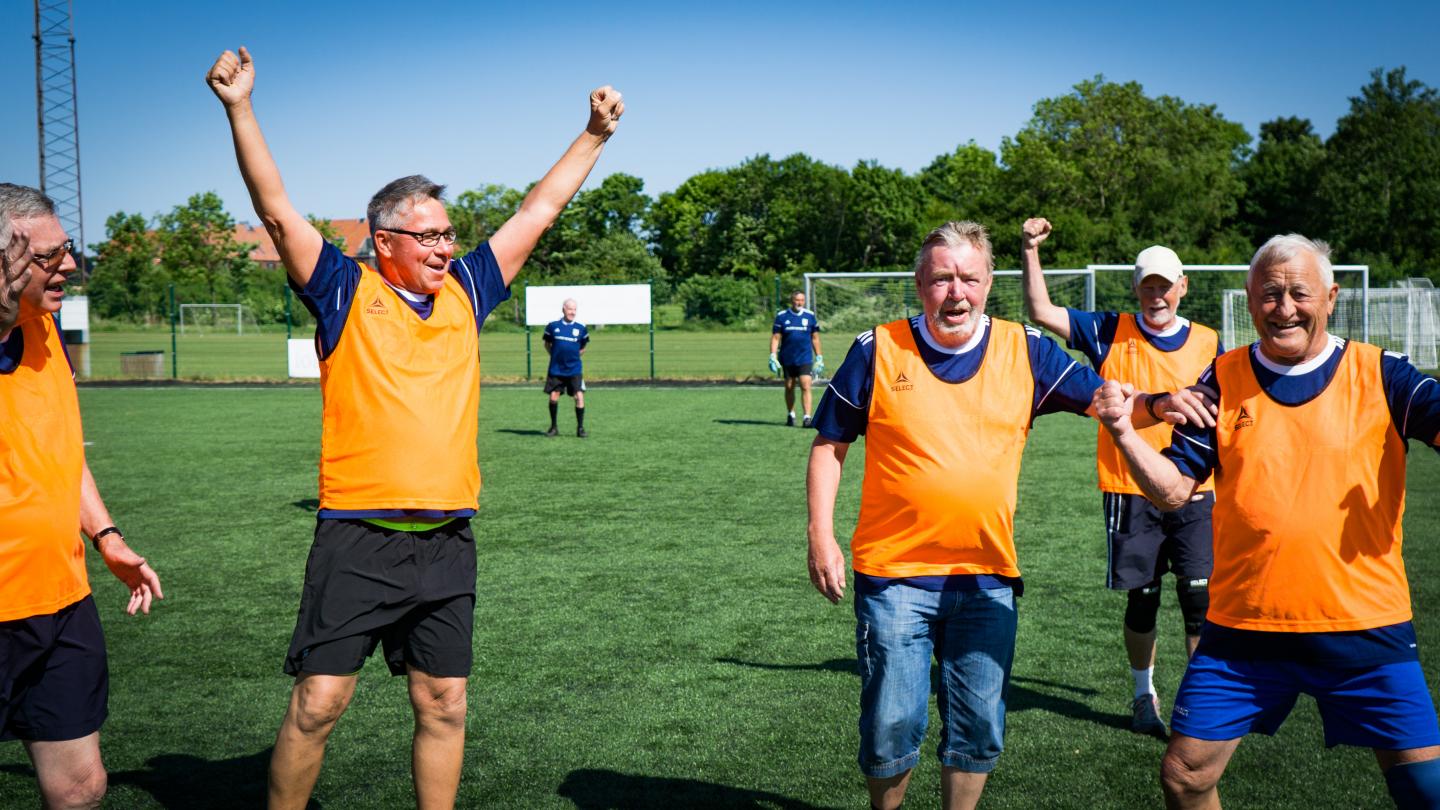
Credit: Bo Kousgaard, Department of Sports Science and Clinical Biomechanics, Faculty of Health Sciences at the University of Southern Denmark (SDU)
Football scores from all angles for untrained middle-aged and elderly women and men with prediabetes. This is the conclusion from a study carried out in the Faroe Islands by football researchers and physiologists from the Department of Sports Science and Clinical Biomechanics at the University of Southern Denmark and the University of the Faroe Islands.
The first article from this study was published two weeks ago in the acclaimed Scandinavian Journal of Medicine and Science in Sports, revealing positive effects on the cardiovascular and metabolic health profile. Today the second article is published in the same journal, on the effects on bone health.
"Individuals with prediabetes and type 2 diabetes have a higher prevalence of osteopenia and bone fractures, so it is essential to develop treatment protocols for them. Our results show that football and dietary guidance are indeed an effective cocktail for improving bone health. The football group derived significant positive effects in the legs and clinically important femoral sites emphasising that football is effective osteogenic training for this participant group," says Magni Mohr, project leader and associate professor at the University of Southern Denmark.
DXA scans were used to evaluate the initial bone health of the participants as well as the training-induced effects, along with blood samples to determine plasma markers for bone turnover and bone formation. From these measurements, 73% of the participants were diagnosed with femoral osteopenia and 24% with femoral osteoporosis prior to the intervention. After 16 weeks of training, between-group changes in favour of football training were observed for bone mineral content of the femoral neck (3.2%) and femoral shaft (2.5%) as well as for bone mineral content (32 g). Plasma osteocalcin and P1NP were elevated in the football group by 23% and 52% respectively, with greater changes than in the control group.
Football is a multipurpose sport combatting lifestyle diseases
"Football is a multipurpose sport that combines strength, endurance and high-intensity interval training, and this makes it a good tool for the prevention and treatment of type 2 diabetes and other lifestyle diseases," says Peter Krustrup, professor of sport and health sciences at the University of Southern Denmark, who has 15 years' experience of studying the health-related effects of football. The 55-70-year old women and men participating in the present study had poor bone health, poor metabolic fitness and poor aerobic fitness. The combination of football training and dietary advice produced good results on all parameters, Krustrup concludes.
Football Fitness as treatment against type 2 diabetes
The idea of football for 60 and 70-year-old patients with poor bone health is new, but the present study revealed that a modified version of football, the so-called Football Fitness concept, was feasible and effective for the middle-aged and elderly patients. The participants took part in football training encompassing a thorough warm-up, ball drills in pairs and games on small pitches, and this type of football was observed to be suitable for 70-year-old women and men with poor bone health and prediabetes. The participants enjoyed the training and did not sustain any severe bone, joint or muscle injuries.
"Normally, you wouldn't think of football as something for 70-year-olds with low physical capacity or poor bone health, but we saw promising training effects and excellent attendance even though the training took place outdoors in winter time. The participants formed good relationships, had fun together and many of them have continued to play Football Fitness," concludes Magni Mohr, who organised the training and testing in the Faroe Islands.
About the study
The study was carried out in the Faroe Islands, with the participants recruited from a national cohort of prediabetics.
50 individuals – 25 of each gender – underwent a 16-week intervention comprising dietary guidance and twice-weekly football training sessions lasting 30-60 minutes. The duration of the training increased progressively from 30 minutes per session in the first 2 weeks to 60 minutes per session in the final 10 weeks.
The participants were 55 to 70-year-old untrained men and women who were prediabetic, had poor physical fitness and were predominantly overweight. Around three-quarters had weak bones (osteoporosis or osteopenia in the legs).
###
The study was carried out in collaboration between researchers from the University of Southern Denmark's Department of Sports Science and Clinical Biomechanics and the University of the Faroe Islands, with funding from the Faroese Research Council (Sjúkakassagrunnurin), the Faroese Football Association (FSF) and the Faroese Diabetes Association (Diabetesfelag Føroya).
The new article: Skoradal M-B, Helge EW, Jørgensen NR, Mortensen J, Weihe P, Krustrup P, Mohr M (2018). Osteogenic impact of football training in 55-70-yr-old women and men with prediabetes. SJMSS is published as part of a special issue on the theme 'Football is Medicine".
Football is Medicine SJMSS virtual issue: https://onlinelibrary.wiley.com/page/journal/16000838/homepage/FootballIsMedicine
Media Contact
Bo Kousgaard
[email protected]
45-23-23-86-24
https://bit.ly/2kTKR44
Original Source
https://onlinelibrary.wiley.com/doi/pdf/10.1111/sms.13252





